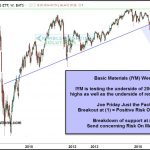The ongoing feud between Puerto Rico and its mostly hedge fund creditors is promptly shaping up as the next “Argentina”, where “vulture investors” may well end up holding the island commonwealth hostage for years, during which time, however, they won’t get paid.
This is shaping up as the latest development in the saga in which earlier today Puerto Rico’s Senate approved a bill calling for a moratorium on a wide range of debt payments, including general-obligation bonds, through January 2017 in what Bloomberg dubbed “the latest escalation of the Caribbean island’s fiscal crisis.”
The measure, passed around 2:30 a.m. local time, would allow Governor Alejandro Garcia Padilla to suspend payments on debt backed by the government, the island’s Government Development Bank and other public agencies, according to a copy of the legislation obtained by Bloomberg. That includes the Sales Tax Financing Corp., known by its Spanish acronym Cofina. A default on those obligations would be a first for Puerto Rico, which so far has only failed to pay on bonds backed by legislative appropriation and rum taxes.
The bill has yet to be enacted: it remains to be reviewed by the island’s House of Representatives on Tuesday after stalling there previously. It’s the culmination of months of posturing by commonwealth officials and bondholders since Garcia Padilla declared that Puerto Rico’s debts were unpayable in June 2015. It reflects the governor’s long-held position that the island can’t continue to pay creditors on time – even those holding constitutionally guaranteed securities – while still providing essential services to residents.
Today’s latest gambit follows a February proposal by Puerto Rico which to repay creditors (who are owed a total of $70 billion) to the tune of 54 cents on the dollar, a move which we then dubbed “Puerto Rico’s opening salvo in what’s likely to be protracted battle to tackle the entire debt burden.”













Leave A Comment